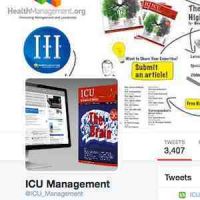In a pilot study into the impact of Twitter on conferences, researchers found that social media may impact on quality of presentations as speakers receive real-time feedback. The study of Twitter posts from a medical conference found that while the majority of tweets were accurate, some were not and misrepresented what the speaker had said. Indeed, in isolation, the "discordant" tweets could be seen to harm the speaker’s reputation, according to researchers.
“In a small sample of tweets captured at an Emergency Medicine Conference and shown to presenters, the majority were deemed to be reflective of the message the presenter was trying to get across. A small number were found not to represent the presenter’s views," said Dr. Damian Roland, an honorary senior lecturer at the University of Leicester and Consultant in Paediatric Emergency Care at Leicester’s Hospitals.
“Tweets are public and therefore any presenter must think about what they do (and don't) want distributed. I have heard presenters say please don't take pictures in the past – could this soon be followed by please don't tweet?" Dr. Roland added.
Social media could help to improve the quality of presentations "as presenters are forced to concentrate on their key messages more and respond to the real-time feedback they are now receiving,” Dr. Roland explained.
The study resulted from collaboration between a group of doctors with a strong interest in social media and was brought together by Dr. Roland. The findings are published in the journal Emergency Medicine.
Dissonance between the speaker's intended message and its translation via a tweet could be due to a number of factors related to the presenter, the tweeter or the technology.
“One potential cause is the quality of the presentation and the clarity with which messages are presented. It was not possible in this study to ascertain whether the whole audience was similarly mistaken or whether this was one individual’s misinterpretation," Dr. Roland pointed out. "Tweeters themselves may consciously or subconsciously phrase the message to achieve greater impact for their followers, an approach which could be viewed as sensationalism in some circumstances."
These factors should be further evaluated in future studies, wherein comparison of tweets from the same talk may determine the extent of these effects, according to Dr. Roland. "Finally, there remains the challenge of constructing a 140-character tweet which accurately communicates the content and context of the intended message.”
Dr. Roland, from the Sapphire Group in the Department of Health Sciences at the University of Leicester and the Paediatric Emergency Medicine Leicester Academic Group at Leicester Royal Infirmary, collaborated with Natalie May, Richard Body and Simon Carley from Central Manchester University Hospitals NHS Foundation Trust and Mark Lyttle from Bristol Royal Hospital for Children and the University of the West of England, Bristol.
Source: University of Leicester
Image Credit: Google Images
“In a small sample of tweets captured at an Emergency Medicine Conference and shown to presenters, the majority were deemed to be reflective of the message the presenter was trying to get across. A small number were found not to represent the presenter’s views," said Dr. Damian Roland, an honorary senior lecturer at the University of Leicester and Consultant in Paediatric Emergency Care at Leicester’s Hospitals.
“Tweets are public and therefore any presenter must think about what they do (and don't) want distributed. I have heard presenters say please don't take pictures in the past – could this soon be followed by please don't tweet?" Dr. Roland added.
Social media could help to improve the quality of presentations "as presenters are forced to concentrate on their key messages more and respond to the real-time feedback they are now receiving,” Dr. Roland explained.
The study resulted from collaboration between a group of doctors with a strong interest in social media and was brought together by Dr. Roland. The findings are published in the journal Emergency Medicine.
Dissonance between the speaker's intended message and its translation via a tweet could be due to a number of factors related to the presenter, the tweeter or the technology.
“One potential cause is the quality of the presentation and the clarity with which messages are presented. It was not possible in this study to ascertain whether the whole audience was similarly mistaken or whether this was one individual’s misinterpretation," Dr. Roland pointed out. "Tweeters themselves may consciously or subconsciously phrase the message to achieve greater impact for their followers, an approach which could be viewed as sensationalism in some circumstances."
These factors should be further evaluated in future studies, wherein comparison of tweets from the same talk may determine the extent of these effects, according to Dr. Roland. "Finally, there remains the challenge of constructing a 140-character tweet which accurately communicates the content and context of the intended message.”
Dr. Roland, from the Sapphire Group in the Department of Health Sciences at the University of Leicester and the Paediatric Emergency Medicine Leicester Academic Group at Leicester Royal Infirmary, collaborated with Natalie May, Richard Body and Simon Carley from Central Manchester University Hospitals NHS Foundation Trust and Mark Lyttle from Bristol Royal Hospital for Children and the University of the West of England, Bristol.
Source: University of Leicester
Image Credit: Google Images
References:
Roland D, May N, Body R, et al. (2014) Are you a SCEPTIC? SoCial mEdia Precision & uTility In Conferences. Journal of Emergency Medicine. DOI:10.1136/emermed-2014-204216
Latest Articles
Twitter, tweet, tweeting, feedback, presentations
In a pilot study into the impact of Twitter on conferences, researchers found that social media may impact on quality of presentations as speakers receive...



























